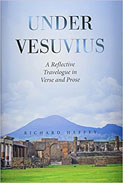
 |
In this unique book, readers discover a landscape in which "Nature cannot expend so much energy and not wear part of itself out." The book opens with a section titled "Preliminaries," which not only establishes the collection's tone in poems like "Agenzia Italia Travel" and "Antiquities" but also establishes the geographical disparity to come. The focus then shifts to Pompeii, where the poet "walked along the / hobbling stones of the very roads / that citizens and slaves trod in Pompeii." From there, the collection unfolds into intimate and personal open-line reflections that encompass everything from one's purpose, to pop culture, to the impact a simple dish of regional food can have on a person and an experience.
Poems like "Mistaken Identity" transport readers into a setting where one culture's nuances, even something as slightly unnoticeable as a simple body gesture, can mean the opposite in another culture. To understand this, one needs only consider the lines: "Impressions: Friendship and eating and drinking were important. / I learned that to pour a bottle of wine with hand turned wrist up / was a sign of displeasure." More relevant to Italy's current situation—especially in Rome, where Benito Mussolini's granddaughter, Rachele Mussolini, won the most city council elections—the poem's commentary regarding Italian politics is imperative. The piece highlights the contrast between Italy's election and what the speaker's own experience with elections has been: "Italian politics was an on-going affair. Presidential election coming. / Only elected officials voted. Not a general election. No wall posters."
Other poems like "Blue Grotto" rely heavily on imagery to take readers on a journey to a place where the past and the present meet. At this meeting place, one's role in life becomes significant and irrelevant at the same time. This beautiful acknowledgment of futility stands out in lines such as "Am I here to do anything more than disappear from the earth, / as Tiberius did while Triton's conch moan echoed." The poem also emphasizes one of the collection's most profound messages—the importance of place to personal experiences: "Secular places can connect us / to humanity's memory of something sacred, / even if that memory isn't yet personally our own."
Eventually, the book shifts from poetry to the story "Windows on the World." At this point in the book, the blending of verse and prose embraces current literary experimentation that utilizes hybridity. "Windows on the World" hosts a wide cast of intricate characters. Like the poems, the story relies on natural imagery and humans' involvement in it. Also, like the poems, the tale focuses on the impacts that place has on personal development and experience. Through the character of Lucinius, readers have the opportunity to explore what it is to be the outcast and the other.
For those unable to travel for whatever reason, this book becomes an important read because it brings the place to the reader. The text at times possesses a metaphysical tone that sprinkles the poems and stories with a subtle spirituality that allows readers to calm themselves, meditate, and experience. For those seeking a Mediterranean getaway but who can't afford the flight and other travel expenses, this collection is the perfect way for them to experience the landscape, history, and culture. Haffey's book takes the travelogue genre and redefines it.